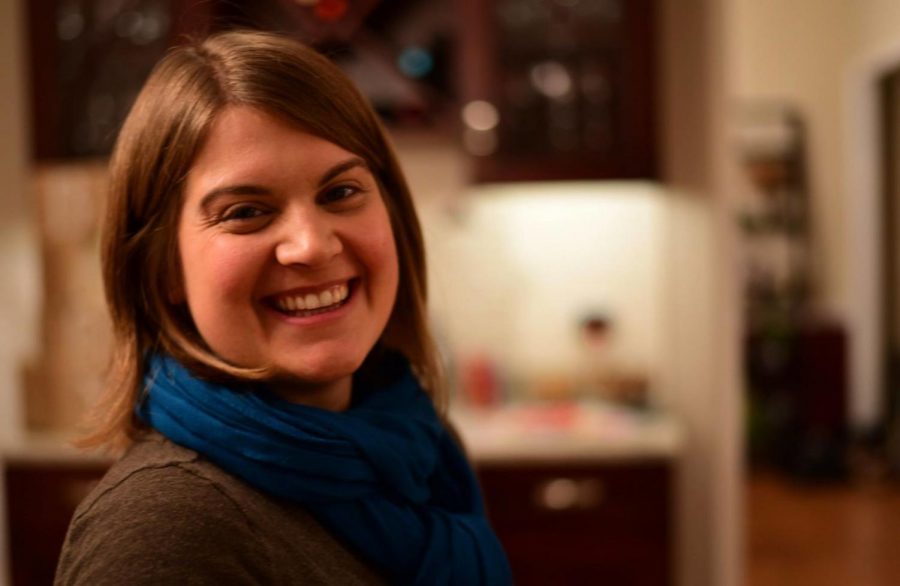First-generation professor extend firsthand advice for first-generation students
Mandy Faretta-Stutenberg, assistant professor and Spanish Basic Language program director, assists first-generation students by relaying her own experiences.
September 20, 2018
DeKALB — University officials have increased efforts to support first-generation college students, and some NIU faculty members have been extending firsthand advice.
Mandy Faretta-Stutenberg, assistant professor and Spanish Basic Language program director, was a first-generation college student and has been working to assist current first-generation students at NIU.
Faretta-Stutenberg was a featured speaker at the inaugural welcome event for first-generation students Sept. 4, where she spoke to groups about her experiences and answered questions.
“I’m really happy that I’m working at a campus that cares about first-generation experiences,” Faretta-Stutenberg said.
After receiving a faculty-wide survey targeted toward first-generation staff last spring, Faretta-Stutenberg said she grew an interest in assisting fellow first-generation students.
“I saw it, and I was like, ‘I immediately need to be a part of that,’” Faretta-Stutenberg said. “I didn’t realize how being a first-generation college student has impacted my interactions with my students and my approach to mentoring until my second year here.”
Faretta-Stutenberg said she came to realize the impact being a first-generation student had on her through a letter from a mentor. She said once it was brought to her attention, the impact became clear as she noted her style of handling her students.
“Part of that was actually reading a letter of recommendation my graduate advisor had written for me on my behalf. [It] had never occurred to me [being a first-generation student] was a factor, [or] anything that had any sort of influence on how I approach my job.”
Faretta-Stutenberg is cautiously optimistic in regard to her hopes for the program’s future.
“I’m really happy to see initiative getting started on campus, more resources and just more recognition for that kind of experience,” Faretta-Stutenberg said.
Faretta-Stutenberg hadn’t given a thought to enrolling in college until her junior year of high school when a routine meeting with her guidance counselor led her to consider the possibility.
“I was just going along, figuring out how to keep doing my job in a law firm [which] I had kept throughout high school,” Faretta-Stutenberg said.
“Looking back, it was totally absurd,” Faretta-Stutenberg said. “Because I was in all these AP classes and honors, I was in a class of 400, and I graduated eighth. Of course, all my teachers were thinking [I] obviously was going to college, but it just wasn’t on my radar.”
Discovering more about career opportunities available with a college education led Faretta-Stutenberg to apply to the University of Wisconsin-Madison. She chose the institution because they offered her four years of tuition and fees paid in full.
Her realization that her experience was unique came when she moved into her dorm and met her roommate, whose parents both graduated from the University of Wisconsin. They brought previously acquired knowledge to the campus Faretta-Stutenberg thought to be invaluable for her first weeks.
The first week of classes presented unfamiliar territory for Faretta-Stutenberg as she tried to navigate a new way of living and balance her classes at the same time.
“I was so determined to not mess anything up, which brought these silly things like leaving way too early for class, going to the wrong building and still getting there an hour before my class started, showing up for office hours, thinking this was a meeting we had to go to,” Faretta-Stutenberg said. “I just wanted to be super diligent.”
“I feel like I didn’t figure out how different my life was until it was kind of absurdly late,” Faretta-Stutenberg said. “I think maybe subconsciously really early on I realized college was my ticket out to something different.”
After obtaining her doctorate from the University of Illinois at Chicago, Faretta-Stutenberg was selected by NIU as a visiting professor and has since moved her way through the ranks of the department through a tenure trackline.
“Ultimately, I really like it here because I get to interact with students a lot, but I also have support for my research, and I can work with graduate students, so it’s the best of both worlds,” Faretta-Stutenberg said.
Faretta-Stutenberg said few resources were in place for her and other first-generation students as she began her higher education. She touched on more recent programs put into place that have made efforts to better prepare students of all backgrounds and experiences to make an adjustment to the college climate.
Faretta-Stutenberg emphasized programs like the support group Breaking Barriers, the faculty-student link and UNIV-101, a class helping first year students orient themselves with resources on campus.
“Something I wish somebody had told me was to not be afraid of asking questions,” Faretta-Stutenberg said. “Take advantage of the resources that are out there. You have to be keeping up with all your course work, so time management is a huge thing.”
Faretta-Stutenberg also said she wished that first-generation students would be encouraged to be aware of the greater meaning of their pursuit of higher education.
“If you’re here, you’re here for a reason,” Faretta-Stutenberg said. “Work hard, believe in yourself, and ask questions.”







